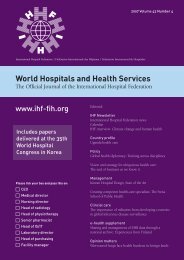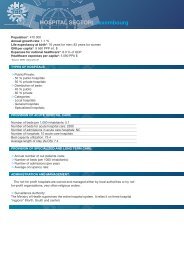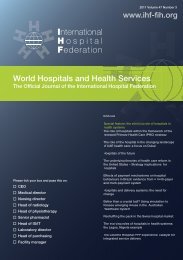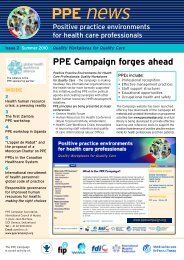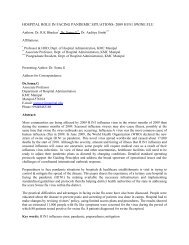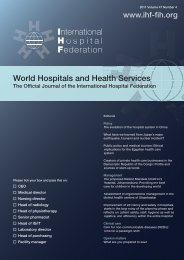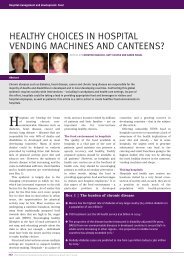Full document - International Hospital Federation
Full document - International Hospital Federation
Full document - International Hospital Federation
Create successful ePaper yourself
Turn your PDF publications into a flip-book with our unique Google optimized e-Paper software.
Innovation and clinical specialities: oncology<br />
that can ensure adequate follow-up and execution of accurate and<br />
targeted referrals. An evaluation of the revised process is planned.<br />
It is envisaged that these findings could assist researchers and<br />
clinicians with the process of developing a psychosocial<br />
assessment and referral pathway. The psychosocial model of care<br />
can also be adapted and utilised in other clinical settings where<br />
psychosocial distress and morbidity is likely. The psychosocial<br />
model of care is already being implemented in the gynaecological<br />
service and ward nurses are being trained in administering the<br />
screening tool. As the results from this quality assurance project<br />
suggest, strategies for detecting and responding to the<br />
psychosocial needs of patients is a vital and achievable<br />
component to the provision of health care. ❏<br />
Acknowledgements<br />
This project was generously funded by Western and Central<br />
Melbourne Integrated Cancer Service (WCMICS). The Breast<br />
Service staff would like to thank the WCMICS for its support in<br />
enabling the improvement of the quality of psychosocial care for<br />
women with breast cancer. The psychosocial model of care project<br />
team would also like to thank staff from the Royal Women’s <strong>Hospital</strong><br />
and The Royal Melbourne <strong>Hospital</strong> who participated in the “health<br />
professionals” consultation phase and women attending The<br />
Breast Service who generously donated their time and thoughts in<br />
the focus groups and interviews.<br />
References<br />
1.<br />
Australian Institute of Health and Welfare and National Breast Cancer Centre. Breast cancer<br />
in Australia: an overview, 2006. Canberra: AIHW, 2006. (AIHW Cat. No. CAN 29.)<br />
2.<br />
Institute of Medicine. Meeting psychosocial needs of women with breast cancer [report<br />
brief]. Washington, DC: National Academies Press, 2004: 1-8.<br />
3.<br />
National Breast Cancer Centre and National Cancer Control Initiative. Clinical practice<br />
guidelines for the psychosocial care of adults with cancer. Sydney: National Breast Cancer<br />
Centre, 2003.<br />
4.<br />
Schou I, Ekeberg O, Sandvik L, et al. Multiple predictors of health-related quality of life in<br />
early stage breast cancer. Data from a year follow-up study compared with the general<br />
population. Qual Life Res 2005; 14: 1813-23.<br />
5.<br />
Badger T, Segrin C, Dorros SM, et al. Depression and anxiety in women with breast cancer<br />
and their partners. Nurs Res 2007; 56: 44-53.<br />
6.<br />
McArdle JMC, George WD, McArdle CS, et al. Psychological support for patients undergoing<br />
breast cancer surgery: a randomised study. BMJ 1996; 312: 813-6.<br />
7.<br />
Shaw BR, McTavish F, Hawkins R, et al. Experiences of women with breast cancer:<br />
exchanging social support over the CHESS computer network. J Health Commun 2000; 5:<br />
135-59.<br />
Competing interests<br />
The authors declare that they have no competing interests.<br />
Article originally appeared in Australian Health Review<br />
(http://www.aushealthreview.com.au) and is reproduced with<br />
permission from the Australian Healthcare Association<br />
(www.aushealthcare.com.au)<br />
80 <strong>Hospital</strong> and Healthcare Innovation Book 2009/2010



